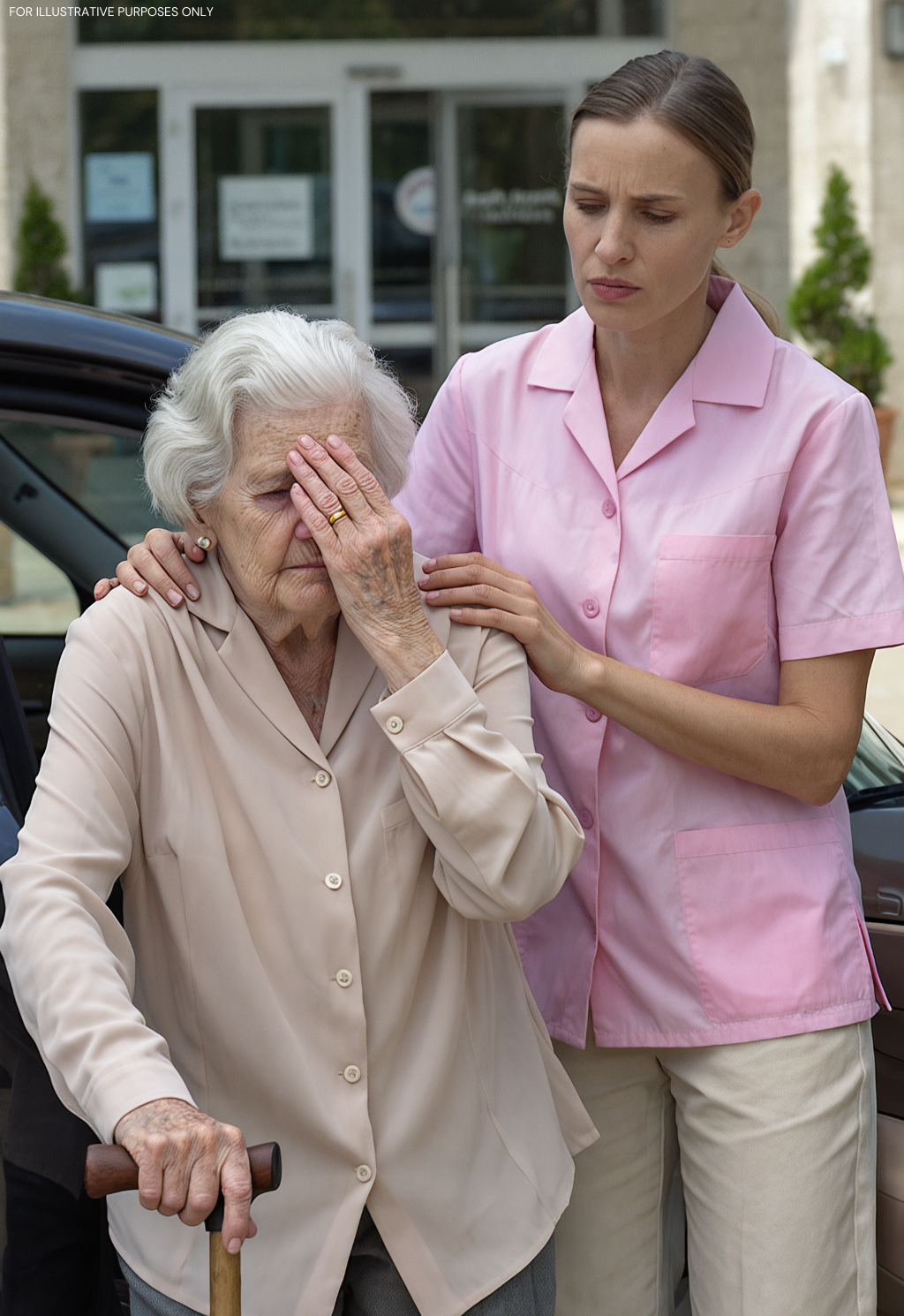
Evelyn Hart sat quietly in the passenger seat of her daughter’s car, her hands resting on a small leather purse she held close to her chest. At eighty-three, the fiery red of her youth had softened into a pale silver, and her face carried the gentle etchings of time. Outside the window, the familiar streets of Brookhaven drifted by, each corner reminding her of the nearly five decades she had spent in her modest two-bedroom home.
She glanced at her daughter, Miriam, who drove with calm concentration. Evelyn had taken her in when she was only seven, a serious little girl whose quiet eyes betrayed sorrow far too heavy for a child. Now, at forty-two, Miriam had grown into a graceful woman whose strength reminded Evelyn of the sturdy maple tree that had stood in their yard through countless storms.
“Do you want me to adjust the heat, Mom?” Miriam asked, glancing over briefly.
“I’m fine, darling,” Evelyn answered softly, though comfort was not what occupied her thoughts.
In the trunk lay a small suitcase packed with what Evelyn thought of as her life in miniature: two photo albums, her wedding ring, three books she loved, and enough clothing for a week. Everything else had been sorted over the past month—some given to cousins, some donated, and the rest entrusted to neighbors. The doctor’s warning echoed in her mind: You should not live alone anymore. Since her fall last winter, her strength had not fully returned. Miriam had been kind but firm, leaving brochures for the Willow Glen senior residence on the coffee table. Evelyn knew what that meant.
They drove on in silence. Evelyn’s throat tightened as they passed the library where she had volunteered for two decades, then the park where she had pushed Miriam on the swings as a child.

“Do you remember how you begged me to push you higher and higher?” Evelyn said, her voice trembling.
Miriam smiled faintly. “And you always gave me one last big push even after telling me not to go too high.”
For a moment, both laughed, the memory sweet but heavy with nostalgia. Then Evelyn realized they had passed the road that led to Willow Glen.
“You missed the turn,” she said carefully.
“We’re not going there,” Miriam replied, her lips curving into a small, secret smile.
Evelyn’s chest tightened. “Then where are we going?”
“Almost there,” Miriam answered, reaching out to squeeze her hand.
Ten minutes later they turned into a quiet neighborhood Evelyn didn’t recognize. Tree-lined streets framed well-kept older houses, each with gardens in bloom. Miriam slowed and pulled into the driveway of a pale blue cottage with white shutters and a wide porch.
“We’re here,” Miriam said, switching off the engine.
Evelyn blinked. “Where is this?”
“Home,” Miriam said simply, stepping out and walking around to help her mother.
The front door opened, and Miriam’s husband, Thomas, appeared with a broad smile. “Welcome home, Evelyn,” he called.
Confused, Evelyn froze on the walkway. “I don’t understand.”
Miriam guided her gently. “Thomas and I bought this house three months ago. We’ve been working on it every spare moment. It’s for you.”
Inside, Evelyn gasped. The living room felt both new and familiar. Her favorite armchair was placed by a sunlit window, her patchwork quilt draped neatly on the sofa, and her framed photographs arranged on the mantel.
“This… this is my furniture,” she whispered.
Miriam nodded. “Of course. Come see the rest.”
Through a bright kitchen where Evelyn’s oak dining table stood proudly, they reached a door at the back. Miriam opened it to reveal a bedroom painted in Evelyn’s favorite shade of pale green. Her bed was made with fresh linen, her grandmother’s old dresser gleamed against the wall, and the adjoining bathroom held a walk-in shower with handrails and a seat—everything her doctor had suggested.
Evelyn sank onto the bed, tears filling her eyes. “You built all this for me?”
Miriam knelt beside her. “Not for you, with you. We never planned to send you away. We wanted you here with us.”
Just then, the twins, Clara and Samuel, bounded in, their excitement barely contained.
“Granny, will you teach me how to make your cherry pie?” Clara asked.
“And you promised you’d help me with my science project garden,” Samuel added eagerly.
Evelyn laughed through her tears, overwhelmed. “But I’ll get in your way. You already have your lives.”

Miriam took her hands firmly. “Do you remember what you told me the day the adoption was finalized? You said family is not about convenience, it’s about choosing each other. You chose me when you didn’t have to. Today, we choose you.”
Evelyn looked around: her books on the shelf, the rocking chair by the window overlooking a little garden, the photos of a life lived together. This wasn’t an ending. It was a continuation.
That evening, they sat around her oak table, sharing a meal as laughter filled the room. Evelyn listened to the clinking of dishes, the playful chatter between Thomas and Miriam, the children’s giggles. She realized home had never been about the walls she left behind but about the people who loved her.
Later, as Miriam helped unpack the small suitcase that had once felt so final, Evelyn touched her daughter’s cheek.
“I was so afraid of being a burden that I forgot I could still be a blessing,” she whispered.
“You’ve always been a blessing, Mom,” Miriam said, her eyes shining.
That night, in her new room, Evelyn fell asleep with peace in her heart. What she thought was the closing of a door had opened instead into a new chapter—one filled with family, laughter, and belonging.